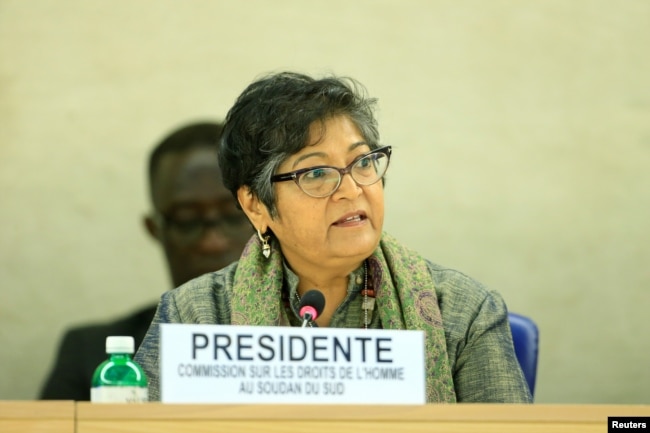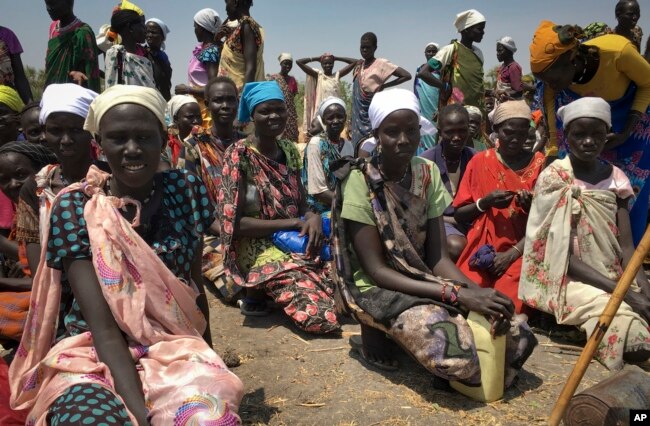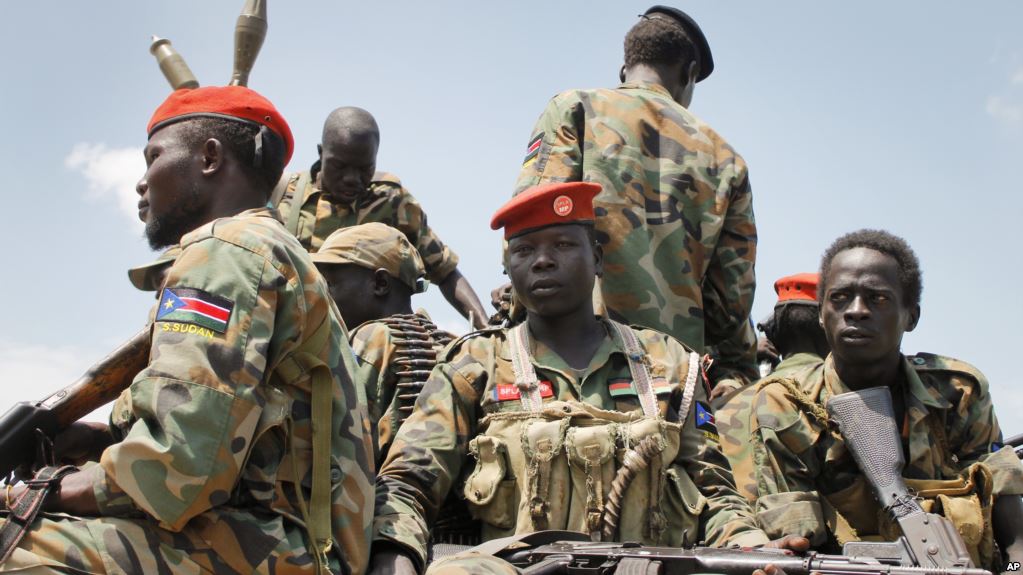In a new report presented to the United Nations Human Rights Council, a top U.N. official warned that conditions in South Sudan have gone from bad to worse in the last few months, and urged the council to launch a new investigation into potential human rights violations.
Yasmin Sooka, chairperson of the Commission on Human Rights in South Sudan, also said a hybrid court, agreed to in a 2015 peace agreement, should be operational by the end of this year.
During a regular session of the Human Rights Council Tuesday, Sooka told observers that unlawful arrests and detentions, torture, rape and killings have become the norm in South Sudan, the world’s youngest country.
“What’s chilling is that they are occurring in many more parts of the country than before. Whole villages burnt to ashes, attacks on hospitals and churches, bodies dumped in rivers, allegations of young girls held as sexual slaves, women, young and old, gang raped and boys and men forcibly recruited,” Sooka said.
The U.N. official is calling for an impartial and independent investigation to be launched by the United Nations to look into reports of crimes committed in South Sudan. Sooka said that unfortunately, impunity is the norm in South Sudan, so the mere knowledge that credible information is being gathered can act as a deterrent to future rights violations.

FILE – Yasmin Sooka, chairwoman of the U.N. Commission on Human Rights in South Sudan, addresses the U.N. Human Rights Council in Geneva, Dec. 14, 2016. Sooka has accused the government in Juba of being behind a “brutal campaign of repression.”
Government often seen as culprit
In the last nine months alone, Sooka said, there has been a massive increase in gross human rights violations and abuses, as well as an escalation in fighting in many parts of the country, putting millions of lives at risk. She indicated to the council that the government is often behind such abuse.
“The government has also conducted a brutal campaign of repression to silence civil society. Journalists who write about the daily suffering of South Sudanese citizens find themselves accused of being the enemy of the state. Civil society activists and their families are threatened,” she said. “The commission regrets that many U.N. and IGAD monitoring staff have been detained by the National Security Service – some for nearly three years – despite repeated demands from the U.N. for access and their release. These are employees of international and regional bodies who have been accused of opposition sympathies and detained without charge.”
She also said South Sudanese officials repeatedly obstruct and manipulate humanitarians from reaching people in need, and reported the commission has found a pattern of ethnic cleansing and “population engineering” in the country.
“When the commission visited the northern town of Malakal we saw how the redrawing of state boundary lines had helped depopulate the town of its Shilluk and Nuer inhabitants,” Sooka said. “Civil servants had been forcibly relocated out of the town on the basis of their ethnicity. The commission has been subsequently told that a number of Dinka, who fled Yei last year and settled around the airport in Juba, were airlifted by the government to Malakal in February this year, just after fighting emptied nearby Wau Shilluk of its Shilluk population.” .

FILE – Women sit in line waiting to receive food distributed by the World Food Program in Padeah, South Sudan, Feb. 18, 2017. South Sudanese girls are being held as sexual slaves, and women, young and old, gang raped as part of a systematic campaign by the South Sudanese government, a new U.N. report alleges.
Government counters
Paulino Wanawila, South Sudan’s minister for justice, said the commission’s assessment “overlooks” the government’s efforts to implement the 2015 peace deal signed by the two warring parties and other representatives in South Sudan.
“The government of South Sudan – to improve the human rights for the people – one of them is acceptance [of] the protection force which we are waiting for. Another one is the evacuation and the collecting of over 200 illegal arms from the people,” said Wanawila.
Despite the government’s statement to the council that 2017 has been a year of peace and prosperity, Sooka said, “Sadly, this is surreal in a country enduring one of Africa’s worst wars.”
In the last month alone, she pointed out to the council, there has been a serious escalation of fighting in parts of greater Upper Nile and the greater Equatoria region, with dire consequences for the civilian population. She noted that in recent months, at least seven civilian officials and military commanders have resigned their posts, protesting the government’s ethnic bias and tribalism.
Sooka said the hybrid court must be established immediately and cases prosecuted. She said the alternative is a “policy of appeasement, making the U.N. complicit in the bloodshed.”
©VOA



